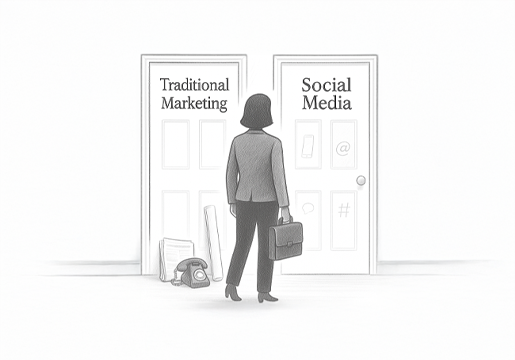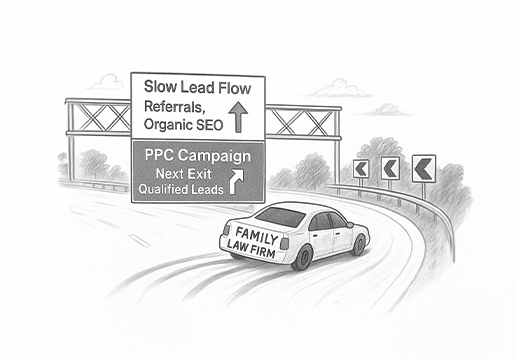Last week, a family law attorney called me frustrated. While she was preparing for a complex custody hearing, her biggest competitor landed three new divorce cases through Facebook referrals. “I don’t have time for social media,” she said. “But I’m losing clients to attorneys who do.”
This conversation happens more often than you’d think. Attorneys know social media can drive business, but between billable hours and court deadlines, it feels impossible to manage effectively.
Here’s the reality: You don’t need to become a full-time content creator to see results. After helping hundreds of law firms build their online presence, I’ve learned that success comes from strategic efficiency, not endless scrolling.
This guide will show you how to leverage social media to attract quality clients without sacrificing your legal practice. We’ll cover the platforms that actually matter for attorneys, sharing content that converts prospects into consultations, and time-saving strategies that work with your demanding schedule.
Why Lawyers Should Embrace Social Media
I know what you’re thinking: “Social media feels risky for attorneys.” You’re worried about compliance issues, ethical violations, or accidentally saying something that lands you in hot water with your state bar. These concerns are valid—the legal profession has good reasons for being cautious about digital marketing.
But here’s what’s shifted dramatically: Your clients are already there, actively searching for legal help.
The Numbers Don’t Lie About Client Discovery
The data tells a compelling story about where law firm marketing is heading:
- 80% of law firms now maintain a social media presence, with LinkedIn leading at 78%, followed by Facebook (53%), Instagram (22%), and X (18%), according to the ABA‘s latest tech trends survey
- 31% of attorneys report gaining clients directly or through referrals from their professional social media use, per the ABA‘s 2023 marketing report
- 96% of people seeking legal advice start with search engines, and that search increasingly extends to social platforms where they ask their networks for attorney recommendations (Google Consumer Survey, Nov 2013)
These aren’t just vanity metrics—they represent real revenue opportunities. One family law attorney in Denver told me that 40% of her new clients now come from referrals that started on social media. Not direct social media leads, but referrals that began when someone saw her helpful divorce advice on Instagram and shared it with a friend going through a separation.
Building Your Brand Beyond Billboards
Social media offers something traditional advertising never could: the ability to show your personality and expertise simultaneously. Think about it—when someone hires an attorney, they’re not just buying legal services. They’re placing their trust in you during one of the most stressful times of their life.
A well-crafted social media presence allows potential clients to get to know you before they ever step into your office. They can see that you’re not just knowledgeable about employment law, but that you also volunteer at the local animal shelter and coach your daughter’s soccer team. This human connection often makes the difference between someone choosing your firm or your competitor’s.
The Competitive Reality
While you’re debating whether social media is worth your time, other attorneys in your market are already building relationships with your potential clients. Every day you’re not present online is another day you’re invisible to people who need your services.
This isn’t about keeping up with the Joneses—it’s about staying competitive in a digital-first world. When two equally qualified attorneys are competing for the same client, the one with a strong online presence often wins. Why? Because social media builds trust and familiarity before the first consultation ever happens.
Legal Considerations & Rules For Lawyers on Social Media
Before we get into the fun stuff—creating engaging content and building your audience—we need to talk about the rules. The good news? They’re not as restrictive as you might think. The key is understanding them so you can work within them confidently.
Understanding Bar Association Guidelines
Every state has specific rules about attorney advertising, and social media falls under these regulations. The Model Rules of Professional Conduct provide the framework, but your state bar likely has additional guidance. Most commonly, you’ll need to ensure your posts are truthful, not misleading, and include proper disclaimers when discussing legal matters.
For instance, if you post about a successful case outcome, you typically need to include language like “Past results do not guarantee future outcomes” or similar disclaimers required by your jurisdiction. It sounds formal, but you can work these requirements into your content naturally without killing the engagement.
Protecting Client Confidentiality Online
This is where many attorneys get nervous, and rightfully so. Attorney-client privilege is sacred, and social media can feel like a minefield. The solution? Create a clear internal policy about what can and cannot be shared.
Never post specific details about ongoing cases, client names, or information that could identify clients without explicit written permission. Instead, focus on general legal education, industry news, and your professional activities. When sharing case successes, keep them anonymous and generic.
The Fine Line of Legal Advice
Here’s where things get tricky: You can educate without giving specific legal advice. The difference lies in the language you use. Instead of saying “You should file for bankruptcy,” try “Bankruptcy can be an option for people struggling with overwhelming debt, but every situation is unique.”
Always include disclaimers like “This post is for educational purposes only and does not constitute legal advice” when discussing legal topics. It might feel repetitive, but it protects both you and your audience.
For a comprehensive overview of social media ethics for attorneys, the American Bar Association’s 12 Rules for Ethically Dealing With Social Media provides detailed guidance on navigating these requirements while building your online presence effectively.
Developing A Strategic Social Media Plan
Now that we’ve covered the legal housekeeping, let’s talk marketing strategy. The biggest mistake I see attorneys make is jumping onto social media without a clear plan. They post sporadically, try to be everywhere at once, and then get frustrated when they don’t see immediate results.
Setting Goals That Actually Matter
What do you want social media to accomplish for your practice? More clients? Better community reputation? Networking opportunities with other attorneys? Be specific here because your goals will determine everything else—which platforms you choose, the type of content you create, and how you measure success.
For most attorneys, the primary goal is lead generation, but don’t overlook secondary benefits. Brand awareness, thought leadership, and referral relationships often provide more long-term value than direct client acquisition.
Know Your Target Audience Inside and Out
Your ideal client isn’t scrolling through TikTok at 2 AM (probably). Understanding where your potential clients spend their time online will save you from wasting effort on the wrong platforms.
If you’re a corporate attorney, your clients are likely professionals active on LinkedIn during business hours. Personal injury attorneys might find their audience on Facebook, where people often share experiences and ask for recommendations. Family law attorneys might connect with clients on Instagram, where life updates and personal struggles are commonly shared.
Start Small, Scale Smart
You don’t need to be on every platform from day one. In fact, I strongly recommend against it. Pick one platform, master it, then expand. This approach allows you to create quality content and build genuine engagement rather than spreading yourself thin across multiple platforms.
Most of our successful attorney clients started with just LinkedIn or Facebook, spent 3-6 months building a solid presence, then added a second platform. By year two, they had a sustainable system that didn’t overwhelm their schedule.
Best Social Media Platforms For Busy Lawyers
Let’s cut through the noise and focus on the platforms that actually move the needle for legal practices. Not every social media platform deserves your attention, especially when time is your most valuable resource.
Facebook remains the king of local engagement and community building. With 2.9 billion monthly users, it’s where many people still turn when they need recommendations for local services—including attorneys.
What makes Facebook particularly powerful for lawyers is its local focus and the way information spreads through social networks. When someone posts asking for a “good divorce lawyer” in your city, you want your satisfied clients to recommend you in the comments.
The platform excels at showcasing your community involvement and firm culture. Share photos from local charity events, highlight your team’s achievements, and post educational content about legal issues affecting your community. Facebook’s algorithm favors posts that generate conversation, so ask questions and encourage engagement.
One criminal defense attorney I work with posts a weekly “Legal Myth Monday” series, debunking common misconceptions about the criminal justice system. These posts consistently generate 10-15 comments and get shared regularly, dramatically expanding his reach within his local market.
Instagram is where you can really let your personality shine while maintaining professionalism. The visual nature of the platform makes it perfect for showing the behind-the-scenes aspects of your practice and building personal connections with potential clients.
For attorneys, Instagram works particularly well for practice areas where emotional connection matters—family law, personal injury, immigration, and estate planning. People going through these legal challenges want to work with someone they trust and like, not just someone with impressive credentials.
Use Instagram Stories to share quick legal tips, office updates, or community involvement. Posts can feature your team, your office space, local landmarks, or infographics explaining legal concepts. The key is consistency and authenticity.
Remember, you’re not trying to go viral—you’re trying to build trust with potential clients in your geographic area. A family law attorney posting about work-life balance or a personal injury lawyer sharing community safety tips can resonate deeply with the right audience.
TikTok
I know what you’re thinking: “TikTok? Really?” But hear me out. TikTok isn’t just for teenagers anymore. The platform has 150 million American users, including a growing number of adults who turn to it for advice and information.
Several attorneys have built massive followings on TikTok by creating short, educational videos about legal topics. @atlcody, Cody Randall, a Georgia trial attorney known for his “Ask A Lawyer” series in public, has built a significant following with 550.5K followers.
@lawbymike, Mike Mandell, a California personal injury attorney, has an incredible 10.6M followers on TikTok. These attorneys aren’t just building audiences—they’re building practices.
The key to TikTok success for lawyers is education over entertainment. Answer common legal questions, explain complex legal processes in simple terms, or react to legal news. The platform’s algorithm rewards consistency and engagement, so if you can commit to posting 3-4 times per week, you might be surprised by the results.
That said, TikTok requires the biggest time investment and creative energy of any platform. Only pursue it if you’re genuinely interested in video content creation.
YouTube
YouTube is Google’s second-largest search engine, making it incredibly valuable for attorneys who want to establish themselves as authorities in their practice areas. When someone searches “How to file for bankruptcy” or “What to expect in a divorce,” you want your video to appear in those results.
The beauty of YouTube is that content has a long shelf life. A long-form video about estate planning basics could attract viewers for years, continuously driving prospective clients to your website and generating leads.
Start with simple videos answering the questions you hear most often from clients. Use a basic setup—good lighting, clear audio, and a clean background. You don’t need expensive equipment to create high-quality content.
For many attorneys, LinkedIn should be the starting point. It’s the most professionally-focused platform, making it easier to maintain appropriate boundaries while building your network and reputation.
LinkedIn excels at B2B networking, thought leadership, and professional relationship building. If you serve other businesses or professionals, this platform is non-negotiable. But even attorneys serving individual clients can benefit from LinkedIn‘s network effects—other professionals in your network often become referral sources.
Share industry insights, comment thoughtfully on others’ posts, and publish longer-form content about legal trends affecting your clients. LinkedIn‘s publishing platform allows you to write articles that can position you as a thought leader in your practice area.
The platform also offers robust advertising options if you want to accelerate your growth or target specific professional demographics.
Creating Compelling Content For Legal Social Media
Content creation is where most attorneys get stuck. They sit down to write a post and suddenly feel the pressure to be informative, engaging, and compliant all at the same time. The blank screen stares back at them, and they close the laptop, feeling defeated.
Let me simplify this: Good social media content for lawyers isn’t about being the most creative person online. It’s about being helpful, consistent, and authentic within your professional boundaries.
The 80/20 Rule That Actually Works
For every promotional post about your services, share four pieces of valuable, educational content. This ratio keeps your audience engaged without making them feel like they’re following a walking advertisement.
Educational content can include legal tips, industry news analysis, answers to frequently asked questions, or explanations of legal processes. The goal is to demonstrate your expertise while providing genuine value to your audience.
I’ve seen attorneys worry that sharing too much legal knowledge will eliminate the need for their services. The opposite is true. When you consistently provide valuable information, you position yourself as the go-to expert people think of when they need help with more complex legal issues.
Content Ideas That Never Get Old
Some content types consistently perform well for attorneys across all platforms:
FAQ Fridays: Answer common legal questions relevant to your practice area. These posts often get saved and shared, extending their reach far beyond your immediate followers.
Legal News Analysis: When a significant legal development affects your clients or community, explain what it means in plain English. This positions you as both knowledgeable and accessible.
Behind-the-Scenes Content: Show your office, introduce team members, or document your day. This humanizes your practice and helps potential clients feel more comfortable reaching out.
Community Involvement: Share your volunteer work, local bar association activities, or community events. This builds local connections and shows you’re invested in your community.
Client Success Stories: With proper permissions and anonymization, share positive outcomes from your cases. Focus on the process and emotions rather than specific details.
Finding Your Voice While Staying Professional
The most successful attorneys on social media have found a way to be authentically themselves while maintaining professional boundaries. This doesn’t mean being stuffy or overly formal—it means being genuinely helpful and approachable.
Your social media voice should reflect your in-person personality. If you’re naturally warm and conversational, let that come through in your posts. If you’re more analytical and detail-oriented, that’s perfectly fine too. Authenticity beats perfection every time.
Social Media Management For Busy Lawyers
Social media shouldn’t consume your practice—it should enhance it. The most successful attorneys I work with spend just 2-3 hours per week on social media management, including ideation and creation, posting content, and engagement.
Batch Creation Is Your Best Friend
Instead of trying to create content daily, set aside 2-3 hours every other week to create multiple pieces of content at once. Use a content calendar to plan topics in advance, write several posts during one session, and schedule them using social media management tools.
This approach is far more efficient than trying to come up with content on the fly. You’ll also notice that your content quality improves when you’re in a focused, creative mindset rather than rushing to post something, anything, because you haven’t posted in three days.
Social Media Tools That Actually Save Time
Hootsuite and Buffer are popular scheduling platforms that allow you to plan and automate your posting across multiple social media channels. Later specializes in visual content and is particularly useful for Instagram.
For content creation, Canva provides templates specifically designed for social media posts, making it easy to create professional-looking graphics even if you have no design experience.
Google Alerts can help you stay on top of legal industry developments and news relevant to your practice, providing a steady stream of content ideas.
When to Consider Professional Help
If you’re six months into consistent social media efforts and still feeling overwhelmed, it might be time to get help. Many attorneys successfully outsource content marketing while handling engagement and relationship building themselves.
Look for law firm social media managers who understand legal marketing regulations and have experience working with professional services. They should be able to create compliant content while maintaining your authentic voice.
Measuring Success & ROI
Social media success for attorneys isn’t just about follower counts or likes. The metrics that actually matter tie directly to your business goals: consultation requests, referrals, and ultimately, new clients.
Tracking What Actually Matters
Lead Attribution: Use UTM parameters on links shared through social media to track which platforms drive the most website traffic and consultation requests.
Engagement Quality: Comments and shares often matter more than likes. A post that generates thoughtful discussion is more valuable than one that gets 50 passive likes.
Referral Increases: Track whether your overall referrals increase as your social media presence grows. Often, the networking effects of social media create indirect business benefits.
Local Visibility: Monitor your local search rankings and Google My Business engagement. Social media activity often correlates with improved local SEO performance.
Setting Realistic Expectations
Social media marketing for attorneys is a long-term strategy. Most attorneys see meaningful results after 6-12 months of consistent effort. The attorneys who quit after two months because they haven’t seen immediate results miss out on the compounding effects of relationship building.
Focus on building genuine connections rather than chasing vanity metrics. A social media following of 500 engaged local professionals is far more valuable than 5,000 followers from outside your service area.
Common Mistakes Lawyers Make On Social Media
After working with hundreds of attorneys on their social media strategies, I’ve seen the same mistakes repeated over and over. The good news? They’re all easily avoidable once you know what to watch for.
The Inconsistency Trap
The biggest killer of social media success for attorneys isn’t compliance issues or lack of creativity—it’s inconsistency. You post regularly for three weeks, then life gets busy and you disappear for a month. When you finally return, you’ve lost momentum and have to rebuild engagement from scratch.
Consistency doesn’t mean posting daily. It means posting regularly on a schedule that your audience can expect. Whether that’s three times a week or once a week, stick to it. Your audience should know when to expect new content from you.
Over-Promoting Your Services
Nothing kills social media engagement faster than turning your profiles into 24/7 advertisements for your legal services. Remember the 80/20 rule: for every promotional post, share four pieces of valuable, non-promotional content.
When you do promote your services, focus on client benefits rather than your credentials. Instead of “I have 20 years of experience in personal injury law,” try “If you’ve been injured in an accident, you shouldn’t have to worry about dealing with insurance companies while you’re trying to heal.”
Neglecting Engagement
Social media is called “social” for a reason. If you’re only broadcasting content without responding to comments or engaging with others’ posts, you’re missing the relationship-building opportunity that makes social media powerful for attorneys.
Set aside time weekly to respond to comments on your posts and engage meaningfully with content from others in your community. This doesn’t mean liking every post in your feed—it means adding thoughtful comments that contribute to conversations. Consider using relevant hashtags to increase discoverability, experimenting with different content formats, and connecting with legal influencers in your area.
Case Studies: Law Firms Succeeding On Social Media
Let me share three real examples of how attorneys are successfully using social media to grow their practices. These aren’t viral success stories—they’re sustainable strategies that busy lawyers can actually implement.
Example 1: @modernlawaz – Educational Family Law Content
@modernlawaz demonstrates how family law firms can effectively use TikTok to educate potential clients. This Arizona-based firm has built over 136,000 followers and 1.5 million likes by making complex family law topics accessible through short, informative videos.
Their strategy focuses on answering real questions about divorce, custody, and spousal support rather than promotional content. They introduce team members, share anonymized case insights, and even address how social media impacts family law cases. This transparency builds trust and shows the human side of their practice, positioning them as both accessible and authoritative in Arizona’s competitive family law market.
Example 2: @immigrationlawyers – Demystifying Complex Legal Processes
@immigrationlawyers showcases how specialized law firms can use TikTok to make complex legal topics accessible. Led by Mariam Masumi Daud, Principal Attorney at Johnson & Masumi, P.C. in Vienna, Virginia, this account has built 217.5K followers and 2.1M likes by demystifying immigration law through engaging, informative content.
Their approach focuses on real-world scenarios—documenting client interactions, airport visits, and practical insights into the immigration system. They cover green card processes, asylum applications, and humanitarian relief options like VAWA and U visas. By showing actual legal work in action, they build trust while educating viewers about complex immigration procedures that often feel overwhelming to those navigating the system.
Example 3: @cristen.martinez – Educational Real Estate Content
@cristen.martinez demonstrates how niche legal expertise can build a significant following on TikTok. Cristen H. Martinez, Esq., a Florida-based real estate attorney and founding partner of Martinez Law, P.A., has cultivated over 223K followers and 1.4M+ likes by providing practical legal insights specifically for Florida real estate.
Her content focuses on educating real estate professionals and homeowners about disclosure duties, eviction alternatives, squatters’ rights, and trial preparation. By targeting a specific audience—realtors, attorneys, and property owners—rather than trying to appeal to everyone, she’s built a highly engaged community that regularly seeks her expertise for both educational content and legal services.
Stop Losing Clients To Attorneys Who Already Dominate Social Media
You’ve seen the strategies and real examples—now it’s time to act. The attorneys winning online aren’t the ones with unlimited time or massive budgets. They’re the ones who started small and stayed consistent.
Every day you’re not building your online presence is another day potential clients discover your competitors instead. Your first step? Choose one platform and commit to posting valuable content twice a week for three months. Don’t overthink it—just start.
Ready to stop losing potential clients to attorneys who are already building relationships online? We help busy lawyers create social media strategies that generate real leads without consuming their lives. Our approach is designed for legal professionals who want results but don’t have hours to spend on content creation.
Schedule a free strategy call to see how we can help your firm dominate social media in your local market while you focus on practicing law.

WRITTEN BY
Luis Marrero
Managing Partner, Stealth Media Marketing
Luis Marrero is a seasoned digital marketing expert with over 7 years of experience in driving online traffic and growth for clients across various industries. Starting his career in 2016 as a consultant for local brick-and-mortar businesses, Luis quickly recognized the power of digital marketing and launched his own agency just a year later. Between 2018 and 2021, he built and sold three successful digital businesses, establishing himself as an authority in the industry.


